- broadcasting
- Anne Boyd
- Alfred Deller
- Ingignero
- Roland Dyens
- viola player
- Sciarrino
- Luigi Dallapiccola: Due Liriche di Anacreonte
 DISCUSSION: John Dante Prevedini leads a discussion about Music and the Visual World, including contributions from Celia Craig, Halida Dinova and Yekaterina Lebedeva.
DISCUSSION: John Dante Prevedini leads a discussion about Music and the Visual World, including contributions from Celia Craig, Halida Dinova and Yekaterina Lebedeva.
 DISCUSSION: What is a work? John Dante Prevedini leads a discussion about The performing artist as co-creator, including contributions from Halida Dinova, Yekaterina Lebedeva, Béla Hartmann, David Arditti and Stephen Francis Vasta.
DISCUSSION: What is a work? John Dante Prevedini leads a discussion about The performing artist as co-creator, including contributions from Halida Dinova, Yekaterina Lebedeva, Béla Hartmann, David Arditti and Stephen Francis Vasta.
A Rather Peculiar Opera
The new production of 'Ariadne auf Naxos'
at La Scala Milan,
reviewed by GIUSEPPE PENNISI
On 28 April 2019, I saw and heard the third performance of the new production of Ariadne auf Naxos by Richard Strauss, on a libretto by Hugo von Hofmannsthal, at La Scala, Milan. This is the third time I've experienced Ariadne at La Scala. In 2000, the production had stage direction by Luca Ronconi, and the conductor was Giuseppe Sinopoli. The staging emphasized melancholy for a world about to be destroyed; the version of Ariadne dated from 1916, during World War I. Sinopoli accentuated this melancholy by extending the tempos, as in his recording with the Dresden Staatskapelle. In 2006, the staging was the same, but the conductor was Jeffrey Tate, who showed Strauss' polyvalent genius in a score with both Mozart's and Wagner's sonorities; among the singers were a splendid Tracy Dahl as Zerbinetta, an impressive Jon Villars as Bacchus and a delightful Marcus Werba as Harlekin. In this new production, the staging is by British director Frederic Wake-Walker: Jamie Vartan designed the sets, and Sylwester Luczak and Ula Milanowska the videos. In the pit, Franz Welser-Möst conducts La Scala's orchestra. This new production had its debut on 23 April and will alternate with other operas and concerts until 22 June 2019.
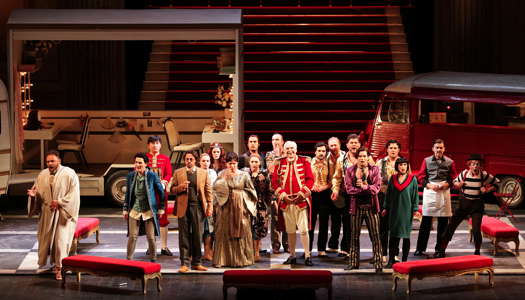
A scene from 'Ariadne auf Naxos' at La Scala, Milan. Photo © 2019 Brescia/Amisano
Ariadne auf Naxos is a rather peculiar opera in a prologue and one act. It is very different from Italian melodrama and comic operas. Its libretto is a parable with two themes: the victory of Eros over Thanatos and the interplay between fiction and reality (where fiction is more ‘real' than life events). This highly sophisticated parable is set to elegant music where Mozart and Wagner (as well as other prominent composers) are echoed and quoted. In spite of this high-brow text and music, over the last twenty-five years I've seen and heard productions of Ariadne auf Naxos in Spoleto, Rome, Genoa, Catania and Venice. I would not call it a popular opera; at the 28 April performance, quite a few rows and boxes were empty. However, it is an opera with a faithful and loyal audience. I am part of this group.
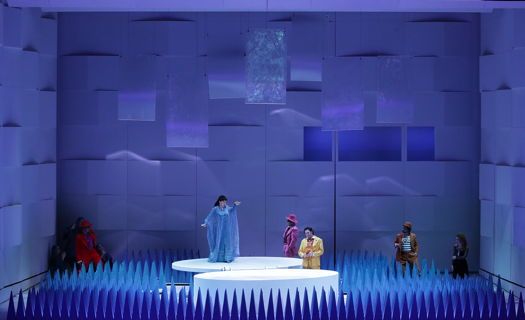
A scene from 'Ariadne auf Naxos' at La Scala, Milan. Photo © 2019 Brescia/Amisano
The stage production has a rather unusual slant: it merges Pop Art (mostly in the Prologue) with references to light musical theatre and operetta (especially in the one act opera). At the debut, part of the audience did not appreciate this, and there were some boos. I dare say that I found it quite convincing, but with one reservation. During the key aria and rondo by Zerbinetta praising (to Ariadne) the virtues of Eros, the princess disappears down a manhole. It seems that the erotic Zerbinetta sings only to herself (and to the audience). As Zerbinetta (interpreted by Sabine Devieilhe) is alone on La Scala's stage (like a soubrette in operetta), the audience's attention is only on her in this impervious musical passage; on 28 April, the audience exploded in open stage applause and ovations.
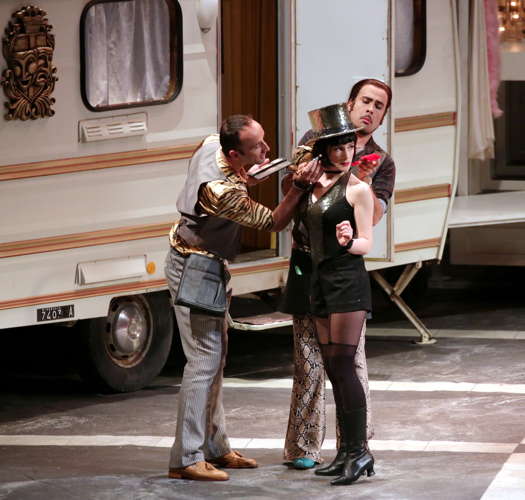
Sabine Devieilhe as Zerbinetta (centre) in 'Ariadne auf Naxos' at La Scala, Milan. Photo © 2019 Brescia/Amisano
Let us focus on the musical aspects. Writing about the 23 April debut of this production, a few reviewers expressed reservations about Franz Welser-Möst; he had reached Milan only five days earlier, and the rehearsal time had not been sufficient. On 28 April, he was warmly applauded because of the round sonorities he extracted from the orchestra; the references to Mozart and Wagner were clearly at the forefront, and skilful listeners could also discover almost hidden quotations from Schubert and Beethoven. This was both a virtuoso exercise for the conductor and orchestra as well as a real joy for the audience.
The sumptuous cast included La Scala's superintendent and musical director Alexander Pereira in the acting (and speaking) role of the Haushofmeister. He jumped onto the stage from his usual box; he was fully dressed in an eighteenth century tailcoat and acted quite effectively with a lot of humour.
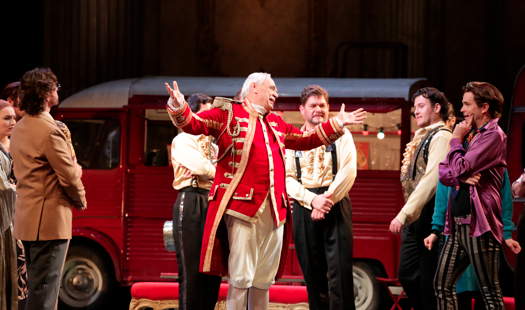
Alexander Pereira as the Major Domo (Haushofmeister, centre) with Joshua Whitener as the dancing master, to his right, in 'Ariadne auf Naxos' at La Scala, Milan. Photo © 2019 Brescia/Amisano
Ariadne requires a very strong cast of singers, especially - as often in Strauss - for the women's roles. Krassimira Stoyanova is a hard-to-forget protagonist; in the role, she is both very dramatic and delicate, and her voice fills the huge auditorium. Sabine Devieilhe is a Zerbinetta with not a very strong volume but with an almost incredible agility (especially in the coloratura passages). Daniela Sindram is a young and tender ‘composer' with a very sweet vocal touch. The trio supporting Ariadne - Najade, Dryade and Echo - are, respectively, the excellent Christina Gansch, Anna-Doris Cappitelli and Regula Muehlemann. It is well known that Strauss did not like tenors: Michael Koenig is a Pop Art Bacchus, a parody of a Wagnerian heldtenor.
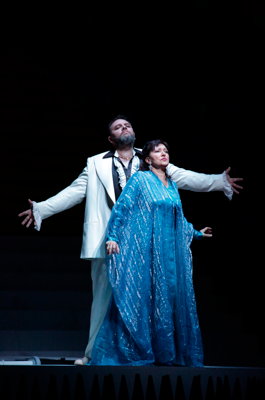
Michael Koenig as Bacchus and Krassimira Stoyanova in the title role of 'Ariadne auf Naxos' at La Scala, Milan. Photo © 2019 Brescia/Amisano
On 28 April, as the curtains fell, there were seven minutes of applause.
Copyright © 1 May 2019
Giuseppe Pennisi,
Rome, Italy



